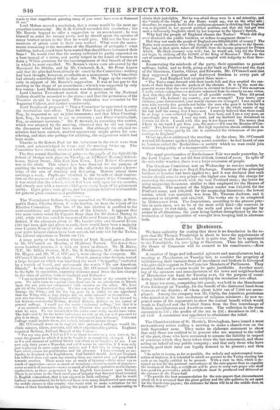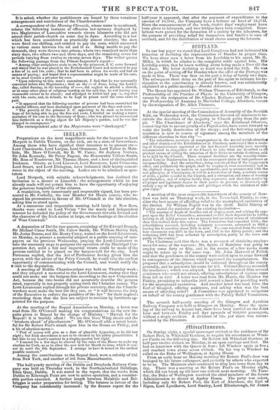Ebe 113robintts.
We have authority for stating that there is no foundation in the re- port that Sir Thomas Troubridge is about to have the appointment of Governor of South Australia ; but it is quite true that he is appointed to the Formidable, 84, now lying at Sheerness. Thus his services in the House of Commons will be secured to his constituents.—Rent Herald.
A number of large and influential spinners and manufacturers had a meeting at Manchester, on Tuesday last, to consider the propriety of withdrawing their business from all merchants and brokers in Liverpool who give their support to Pro-Corn-law Members of Parliament. They resolved that such a course would be quite justifiable. Another meet- ing of the spinners and manufacturers of the town and neighbourhood of Manchester was fixed for Tuesday next, for the purpose of consi- dering further of the matter, and carrying the resolution into effect.
A large tea-party, comprising 500 guests, was held in the Manchester Corn Exchange on Tuesday, for the benefit of the distressed hand-loom weavers of the district ; of whom about 2,300 out of 7,000 are unem- ployed. Among the company was Mr. Curtis, the American gentleman who attended at the late conference of religious ministers he now re- peated some of his arguments to show the mutual benefit which would result to England and the United States from the free interchange of British manufactures and American corn. The collection in the room amounted to 75/. ; the profits of the tea to 251. ; donations to 101.; in all 110/. A committee was appointed to administer the relief.
The Churchwardens of St. Martin's, Birmingham, have issued a most extraordinary notice calling a meeting to make a church-rate on the 10th September next. They make an elaborate statement to show that only those are entitled to be present who are assessed to the relief of the poor, those who have consented to assume the liability in respect of premises which they have taken since the last assessment, and those acting on behalf of any public company ; and that only those who have actually paid their rates can legally demand to be present ; and then say- " In order to insure, as far as possible, the orderly and uninterrupted trans- action of business, it is intended to admit no persons to the Vestry meeting but such as arc legally entitled to be present. With a view to this, which is de- signed no less for the personal convenience of the rate-payers than to expedite the business of the day, a certificate will be given to every rate-payer who shaII have paid his poor-rates ; which certificate must be produced and delivered at the entrance to the Town-hall.
" To provide the best accommodation for the rate-payers that circumstances admit of, it is arranged that the great gallery and the side-galleries be set apart for the female rate-payers; the entrance for them will be at the middle door, in Paradise Street."
It is asked, whether the parishioners are bound by these vexatious arrangements and restrictions of the Churchwardens ?
A correspondent of the Morning Chronicle, whose name is mentioned, relates the following instance of offensive law-tyranny displayed by two Magistrates of Lancashire towards eleven labourers who did not attend their parish-church on some day in June. According to a law which has been considered as practically almost obsolete, the men were fined one shilling, and ordered to pay the costs, which amounted to various sums between 10s. 6d. and 11. 4s. Being unable to pay the demands, they were thrown into prison; where two remained more than sixty days, two others two and three days, and the remaining seven for periods varying from twelve to twenty-seven days. The writer quotes the following passage from the Prison-Inspector's report- " Among other complaints made to me by the prisoners, J. C. came forward and stated that he was placed in the Ecclesiastical Court and sentenced to pay a fine of ls. and 14s. costs ; that he bad been in prison ten weeks, and bad no means of paying ; and hoped that a representation might be made of his case, or he must remain a prisoner for ever.
"Upon referring to this man's commitment, I find that he was summarily convicted before two Magistrates ; that on the — of June, being the Lord's- day, called Sunday, in the township of —, did neglect to attend a church, or at some other place of religious worship on the said day, he not having any reasonable excuse to be absent ; and adjudged to forfeit and pay Is., together with 148. costs, and, in default, to be kept in prison until the same sums be paid.
" It appeared that the following number of persons had been committed for a similar offence, and been discharged upon payment of the fines and costs. "The poverty of the prisoner J. C. appearing to be such as to leave no hope of his being able to pay the fine and costs, I decided on making a repre- sentation of his case to the Secretary of State ; who was pleased to recommend him forthwith as a fitting object for her Majesty's pardon, and he was dis- charged in consequence." The correspondent asks if the Magistrates were " discharged."



























 Previous page
Previous page